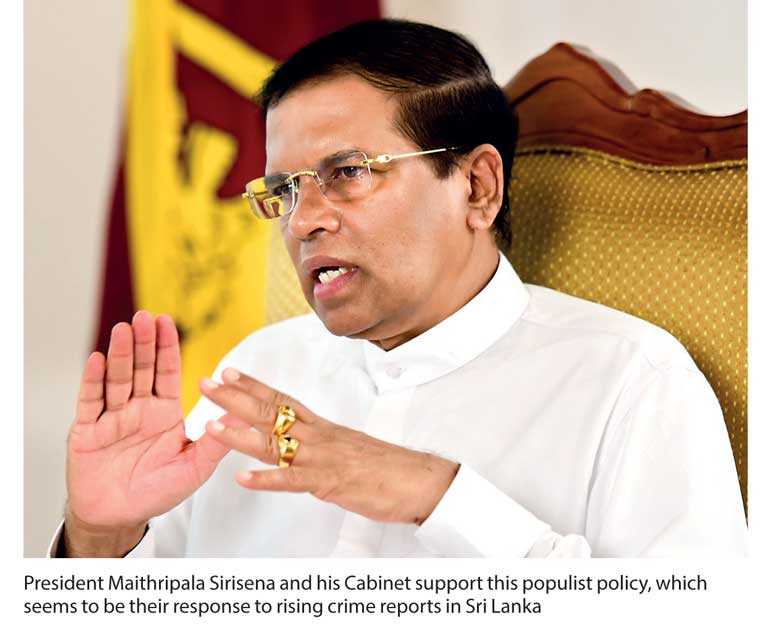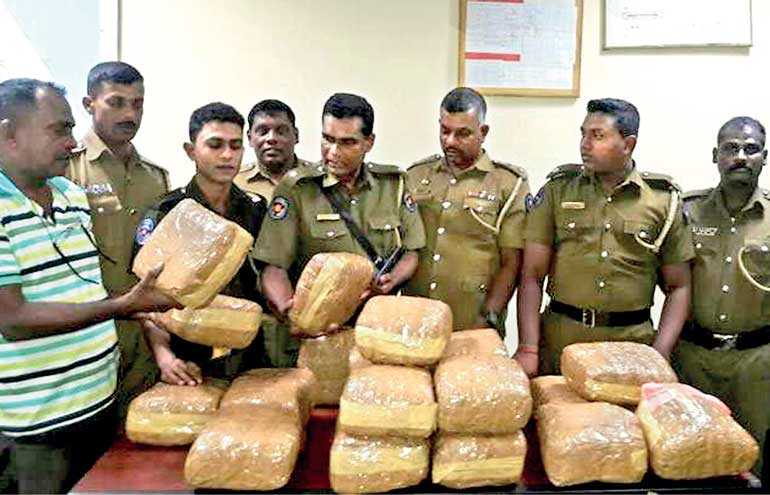Sunday Feb 22, 2026
Sunday Feb 22, 2026
Wednesday, 1 August 2018 00:00 - - {{hitsCtrl.values.hits}}


 “Some may think that the death penalty is too harsh a penalty. I do not think so. Many countries have come to the stage where they accept the death penalty” – Ranil Wickremesinghe, 1984.
“Some may think that the death penalty is too harsh a penalty. I do not think so. Many countries have come to the stage where they accept the death penalty” – Ranil Wickremesinghe, 1984.
Prime Minister Ranil Wickremesinghe stated the above during the Parliamentary debate on the Poisons Opium and Dangerous Drugs Ordinance of 1929 Amendment Bill on 22 March 1984. At the time, he was the Minister of Education who endorsed President J.R. Jayawardena’s proposal to introduce the death sentence for drug-related offences.
Despite its inefficacy, the death sentence for drug-related offences is back on the policy agenda and political limelight. The evidence of the steady rise in drug seizures, arrests, drug-related prison admissions, drug use, drug-related harm and relatively stable drug prices suggests that the nation’s policy on drugs that existed for over three decades needs rethinking.
There had been a number of articles written on the subject matter although none looked at the origins of the death sentence for drug related offences in Sri Lanka. Furthermore, there is little information on the socio-economic and political factors associated in adopting and implementing this policy choice.
This article will focus on the above information gap, identifying and discussing some of the drivers for the ‘war on drugs’. I will apply a policy science approach to understand drug policy development that is situated in the history of Sri Lanka.
The heroin epidemic
in the 1980s
By the late 1970s, there existed a growing cohort of ageing opium and cannabis users. The novelty of a heroin epidemic, introduced by tourists in the late 1970s was largely confined to Colombo and some parts of southern Sri Lanka.
Young people started using heroin, which concerned politicians, the clergy and general public due to the uncertainties created on how to manage a ‘novel drug problem’. There also existed a belief among policy-makers and politicians that a drug-free society is absolutely required for the socio-economic development of the country, particularly as young people were considered as the wealth of the nation.
Politicians, prominent Buddhist monks and Christian priests were questioning the meaning of moral values and good citizenship in society. The use of intoxicants was seen as immoral, and those who use drugs were seen as social outcasts. Consequently there was a moral underpinning to the policy-making and political concerns at the time. Their moral ideology regarded drugs as dangerous, threatening to cultural values and as evil substances that compromise the values in Sri Lankan culture. State intervention and tough law enforcement were seen as legitimate responses to foster moral and upright behaviour.
By 1982, Interpol confirmed Sri Lanka’s status as a transit country for the movement of heroin from countries in the Golden Triangle into Europe, with organised international drug trafficking syndicates operating within Sri Lanka. During this period, evidence also emerged of a link between heroin trafficking carried out by the LTTE and financial proceeds being used to fund terrorism.
With the escalation of violence between Sinhalese and Tamils, and the demand for a separate Tamil state in the North and East of Sri Lanka, drug trafficking was perceived as a major problem and a direct threat to national security and stability of government. Politicians and law enforcement personnel viewed the existing legislation at the time as being outdated to manage the emerging new trends of drug use and trafficking.
The Poisons, Opium and Dangerous Drugs Ordinance of 1929 was amended within this national context. The amendments ensured the introduction of the death sentence for drug related offences, stringent law enforcement on drug users and traffickers, and the creation of the National Dangerous Drug Control Board to coordinate all efforts related to drug control.
Policies adopted since 1984 ensured that the response to the drug problem was firmly located within the criminal justice system leading to a large number of drug users being imprisoned. Out of the total prison population in the country, nearly 45% of men and women were admitted for narcotic-related offences in 2000, the largest single category according to the Handbook of Drug Abuse Information published by the National Dangerous drug Control Board in 2002.
The majority of drug-related prison admissions were for heroin related offences (88%) with the remaining (12%) for cannabis. These figures remain stable 17 years later and indicate that a large proportion of people who are in the prison system are drug users as opposed to large scale traffickers.
The international environment had a significant influence in regards to the introduction of the death sentence and in shaping drug policy in Sri Lanka. I will now discuss this in some detail.
International context
and national
political landscape
During the 1980s, within the Asia Pacific region, countries such as Malaysia, India, Bangladesh, Pakistan, Singapore, Taiwan, Thailand, and Indonesia introduced the death penalty for drug related offences. The rapid spread of this populist policy option across the Asia Pacific region may be the result of a process whereby government elites copied the social commitments made by other governments, considering them to be advanced, progressive and morally praiseworthy.
It is learned that Sri Lanka copied the death sentence from Singapore and Malaysia at the time without any scientific knowledge about its efficacy as a policy option. These were both similar economically, capitalist countries with legislation to use the death sentence for people convicted of drug related offences. Sri Lankan elite decision-makers at the time were inspired by these countries’ economic growth, indicating a desire to follow their path to development.
Although there was limited consensus on the introduction of the death penalty between police officers and politicians, President J.R. Jayawardena who held executive power was able to obtain unilateral agreement from not only Cabinet colleagues to back the Amendment Bill, but also the support for the death sentence from Members of Parliament. However, its application has been symbolic as there have been no executions of drug users or traffickers.
When a death sentence is issued, the presiding judge states that the person should be imprisoned and executed at a time nominated by the President. Over the last three decades, none of the Presidents in office have implemented the order, which in effect suspends the death sentence effectively to one of life imprisonment. So, why is it not implemented or abolished?
Seen to be tough
on crime?
Initially, policy-makers have been of the opinion that the death sentence would be a deterrent against drug use and trafficking. The introduction of the death sentence signalled a tough law enforcement and zero tolerance approach. However, research conducted worldwide on its efficacy states that it is a ‘costly failure’. A failure simply because it has not been able to reduce crime, drug use, drug related arrests and prison admissions.
Some also argue that the death penalty violates international conventions on human rights as it denies the most basic and fundamental human right, the right to life. However, its existence has been of interest to Presidents, politicians and some senior civil servants who advised Presidents in Sri Lanka.
All Presidents in Sri Lanka have been keen supporters of the death sentence and the prevailing policy on drug control that existed for over three decades. However, some Presidents may have appeared tough on crime, particularly in regards to stringent law enforcement against drug users and traffickers for time to time. The fact that the President, the most powerful politician in the country, had a keen interest in, and control over drug policy, is indicative of its importance to the core of economic, political and social decision-making.
There had been unanimous support in Parliament for President Chandrika Bandaranaike Kumaratunga to pass a resolution in 1995 to implement capital punishment. In 1999, President Kumaratunga did implement it by issuing a Presidential Proclamation, so it would become a deterrent to organised and serious criminals in the country.
However, in the face of strong opposition from national and international human rights groups, the death sentences have been automatically commuted to life imprisonment. In January 2001, the government revoked this decision to automatically commute the capital punishment sentence to one of life imprisonment.
Implementing the death penalty was raised again following the assassination of a prominent High Court Judge Sarath Ambepitiya and his bodyguard on 19 November 2004. The deaths were suspected of being an order from a major drug trafficker. Justice Ambepitiya had given a life sentence to a woman who had trafficked drugs on the day of his assassination. A judge being assassinated for the first time in Sri Lanka and the link to a drug trafficker was a major political concern due to the implications for state security and the independence of the Judiciary.
Afterwards President Kumaratunga seized the opportunity to again try to implement the death penalty for the crimes of murder, rape and drug trafficking. Capital punishment for convicted drug traffickers had been a politically charged issue and appears to have been associated with politicians’ perceptions of the will of the electorate.
From time to time, Buddhist monks, Christian priests and the public have lobbied for the implementation of the death sentence. Public attitudes towards the drug problem had been utilised by elected officials to legitimise government action on prohibition and tough law enforcement.
While the legitimisation of prohibition was inextricably linked to the need to maintain a more moral and secure society, prohibition also served the agenda of politically active groups and the electorate. ‘Seen to be tough on crime’ during periods of increased crime reports in the media appears common and popular among Presidents. It can be considered as populist policy, merely political rhetoric to attract votes and support.
Some ministers in the present Government do not personally believe that implementation of the death sentence is the ‘magic bullet’ for problems concerning drugs in contemporary Sri Lanka. Recently, Ministers Dr. Rajitha Senaratna, Mangala Samaraweera and some other Ministers publicly stated that they do not personally support the idea of capital punishment.
Some sections of the Buddhist community and Christian priests also share these views as they believe in ‘abstaining from taking life’. Although these dissenting views exist, collectively, President Maithripala Sirisena and his Cabinet support this populist policy, which seems to be their response to rising crime reports in Sri Lanka.
Future directions
Existing legislation on drugs muddles ‘drug users’ and ‘traffickers’. It makes provision to either sentence a person to death or to life imprisonment, for a person who is in possession of three grams of morphine, or two grams of cocaine or two grams of heroin (for personal use). There is little demarcation between drug users, street-level dealers and large scale traffickers when sentencing for drug related offences. Although this was raised by some law enforcement professionals for over a decade, it has received little attention and political support.
Majority of those who are addicted to drugs are unfortunate individuals from disadvantaged backgrounds. Similarly, majority of drug users admitted to prison are from lower socio-economic backgrounds who may require treatment and rehabilitation.
International evidence and the UNODC suggest that voluntary community-based treatment programs produce better outcomes when compared to coerced or compulsory treatment in prison. At present programs are implemented in some prisons to rehabilitate drug users. A comprehensive evaluation on the outcomes of the Drug Dependent Persons’ Treatment and Rehabilitation Act No. 54 of 2007 is also overdue.
The National Dangerous Drug Control Board has conducted a significant amount of work in regards to the drug prevention, treatment and rehabilitation agenda. Building on these achievements, the drug problem needs to be seen and framed as a public health issue. At present, the country’s drug problem has been framed as a matter for the criminal justice system. International evidence clearly demonstrates that drug use disorders are best managed within a public health system.
One of the primary reasons for maintaining a penal approach to managing drug problems is due to its increasing use as a political tool. While there exists consensus on a tough law enforcement approach to manage drug problems, a debate needs to begin to ensure a public health agenda is incorporated into policymaking. Stakeholders with divergent views, including the knowledge experts whose views on the drug problem had not been heard should be included in this debate so that consensual knowledge on the drug problem expands.
Attention should be paid to successive shifts in drug policies of other countries, from which Sri Lanka has previously learned and from which the death sentence was copied. For example, Malaysia has moved from solely having harsh punitive measures to include a public health approach.
The cessation of compulsory treatment and the establishment of voluntary drug treatment facilities indicate that Malaysia’s response is beginning to include a health-oriented approach as part of its overall drug policies. There are other policy lessons that can be learned from countries such as Switzerland, Portugal, U.K, Australia and Netherlands.
Finally, there is no scientific evidence to support the war on drugs. The war on drugs is primarily founded in moralised policymaking arenas where political interests have overshadowed the real needs of drug users and their loved ones.
[Dr. Nimesh Samarasinghe (PhD, MSc, BSc (Hons), DipHE) has extensive experience working in the British National Health Service in clinical, managerial and commissioning roles. He is a subject matter expert on international drug control policies. He is also an associate member of the Drug & Alcohol Research Centre at Middlesex University, London.]